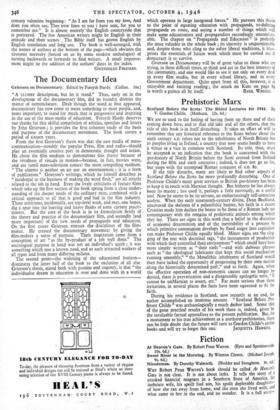The Documentary Idea
Grierson on Documentary. Edited by Forsyth Hardy. (Collins. 16s.)
" A CLUMSY description, but let it stand." Thus, early on in the development of the documentary film, did its founder dismiss the matter of nomenclature. Drab though the word at first appeared, documentary has now come to mean something to most people, and, more important, to stand for much that is progressive and inspiring in the use of the mass media of education. Forsyth Hardy deserves our thanks for this skilful compilation of articles, speeches and letters by John Grierson ; it provides the first coherent study of the basis and purpose of the documentary movement. The book covers a period of sixteen years.
From the first Grierson's thesis was that the new media of mass- communication—notably the popular Press, film and radio—should play an essentially creative part in democratic thought and action. He chose the film medium to demonstrate this theory because of the vividness of visuals in motion—because, in fact, movies were, and are (until mass-television comes) the most compelling medium. " The cinema is neither an art nor an entertainment ; it is a form of publication." Grierson's writings, which he himself describes as " incidental to the business of making the word flesh," are all strictly related to the job in hand. Even the lively criticisms of feature films which take up the first section of the book spring from a close under- standing of the deeper needs of the ordinary man, combined with a critical approach to all that is good and bad in the film industry. These criticisms, incidentally, are top-level work, and may, one hopes, dig a spur into the heaving and heavy flanks of some current practi- tioners. But the core of the book is in its formulation firstly of the theory and practice of the documentary film, and secondly (and more important) of the new needs of propaganda and education. On the first count Grierson stresses the disciplines of the film- maker. He created the documentary movement by giving the film-makers a sense of purpose. Their inspiration came from a conception of art " as the by-product of a job well done." The sociological purpose in hand was not an individual's quirk ; it was something which met a known need, and as such attracted workers of all types and from many differing milieus. The second point—the widening of the educational horizon— dominates the latter half of the book to the exclusion of all else. Grierson's thesis, stated both IA ith passion and cogency, is that " the individualist dream in education is over and done with in a world
which operates in large integrated forces." He pursues this thesis to the point of equating education with propaganda, re-defining propaganda en route, and saying a number of things which will make some educationists and propagandists exceedingly uncomfort- able. The chapter on "Propaganda and Education" is probably the most valuable in the whole book ; its sincerity is unquestionable and, despite those who cling to the softer liberal traditions, it blue- ,prints the essentials of future work which must be carried out if democracy is to survive.
Grierson on Documentary will be of great value to those who are trying, in these difficult times, to think and act in the best interests of the community, and one would like to see it not only on every desk in every film studio, but in every school library, and in every Government department. Quite apart from all this, however, it is enjoyable and exciting reading ; the attack on Kant on page 89






























 Previous page
Previous page